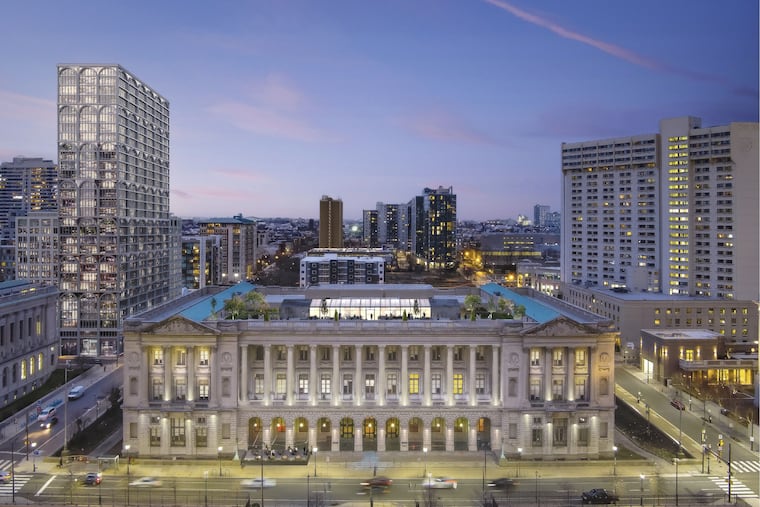See what the reimagined former Family Court building and new African American Museum on the Parkway could look like
The proposal calls for the Family Court building to become a 200-plus-room hotel with a restaurant and event space. New buildings will house expansions of the African American Museum and the library.

The city has chosen two developers to lead the transformation of the historic former Family Court building on the Benjamin Franklin Parkway into a boutique hotel and to bring an expanded African American Museum in Philadelphia to a prominent location on the boulevard.
National Real Estate Development, based in Philadelphia, and Frontier Development & Hospitality Group, a firm based in Washington and founded by its Black managing principal, will reimagine the 247,000-square-foot Beaux-Arts building at 1801 Vine St. and an 88,000-square-foot adjacent parking lot at 1901 Wood St., behind the Free Library of Philadelphia.
The hotel in the Family Court building would have more than 200 rooms, amenities, a restaurant, a bar, and event spaces. The proposal calls for new buildings at the site of the existing parking lot that will house the African American Museum in Philadelphia, which is moving from its smaller location at 701 Arch St.; the expansion of the Free Library’s Parkway Central Library; and the library’s new Children and Family Center.
» READ MORE: City starts new search for developer to revamp historic Family Court building on Parkway (From 2021)
The city has envisioned the Family Court building as a hotel since it began asking for redevelopment proposals for the Center City property in 2010.
The city committed $50 million in funding for the new project as part of its capital budget beginning in fiscal year 2025, specifically for the development of the African American Museum’s new space.
Jodie Harris, president of the Philadelphia Industrial Development Corp., the city’s public-private economic development corporation, said at a news conference Tuesday that the proposal “represents a unique fusion of sustainable, forward-thinking development and a profound respect for Philadelphia’s history.”
City officials announced last August that four development companies were finalists to redesign the site and could submit proposals, which were due in February.
“This particular proposal offered the best mix of development team diversity, experience, project financing, and a very thoughtful design,” Harris said.
The earliest projected completion date is 2028. The city and the developers still need to negotiate terms for the development, and the developers will need a variety of permits and will have to complete historic rehabilitation work on the court building, which was constructed in 1941 and is listed on the Philadelphia Register of Historic Places. The developers said they will pursue federal historic tax credits to help finance the project.
Evens Charles, founder and managing principal of Frontier Development & Hospitality Group and a former Philadelphia teacher, said that to be selected as a co-developer on a “transformational project” that will help the African American Museum grow “humbles me, and I’m just filled with so much gratitude that the City of Philadelphia, PIDC, and all stakeholders put in their [request for proposals] a diversity and equity component to allow a firm like mine to have this great opportunity.”
» READ MORE: African American Museum will move to former Family Court building on Ben Franklin Parkway
The project will join others underway on or near the Parkway, including Calder Gardens, a new museum that will showcase the work of Alexander Calder, one of Philadelphia’s most famous artists, between 21st and 22nd Streets. And the city is asking the public for feedback as it looks to reimagine the Parkway into something more parklike.
Both the Family Court building and the Free Library were modeled after buildings on a public square in Paris.
Sabrina Brooks, chair of the African American Museum in Philadelphia’s board of directors, said the museum is “excited to have a new, state-of-the-art building dedicated to fulfilling our mission and vision.”
“We envision AAMP to be a world-class destination while also serving as a pillar and resource to the communities that we all call home,” she said.
To make that happen, she said, the museum needs space for gathering, exhibitions, educational programming and community engagement, and storage of artwork and artifacts.
“Our new location will serve as a reminder of Philadelphia’s inherent connection to Black history, culture, and heritage,” she said. “And we will submit our legacy here in Philadelphia alongside famed institutions like the Philadelphia Museum of Art and the Barnes Foundation.”
» READ MORE: After decades, Ben Franklin Parkway is hot (From 2015)
The site also includes the Parkway Central Library’s new Children and Family Center and auditorium. Kelly Richards, president and director of the Free Library of Philadelphia, said the library would explore opportunities to collaborate with the museum “to define and celebrate the African American experience, which will enrich the cultural landscape of the Parkway.”
Kelly said he is grateful for the support the library has received. “This expansion will help us advance literacy, guide learning, inspire curiosity among residents of Philadelphia,” he said.
In 2020, PIDC broke an agreement to sell the Family Court building to Florida-based Peebles Corp., one of the country’s largest Black-owned real estate development firms, which planned to turn the space into a 203-room luxury hotel. Officials said the decision was the result of concerns about hospitality demand during the pandemic.
The company won a competitive bid for the project in 2014 but had struggled to start work due to financial obstacles and issues related to the building’s historic status.